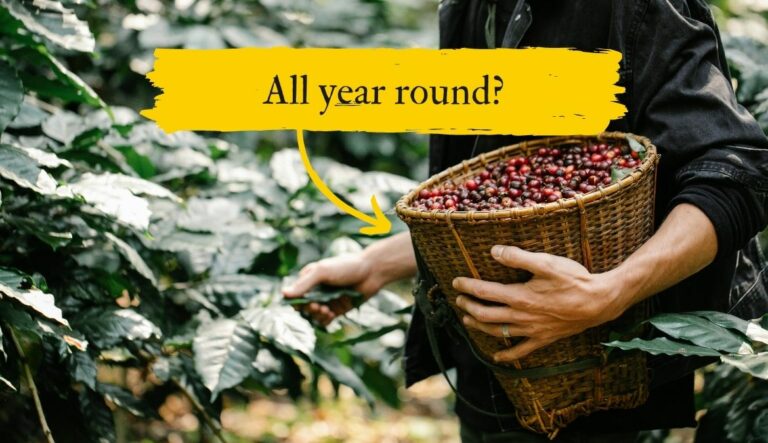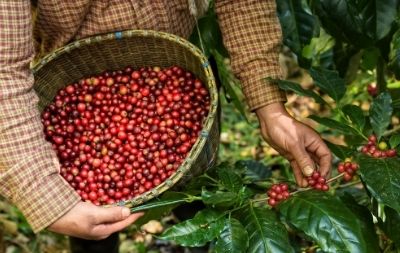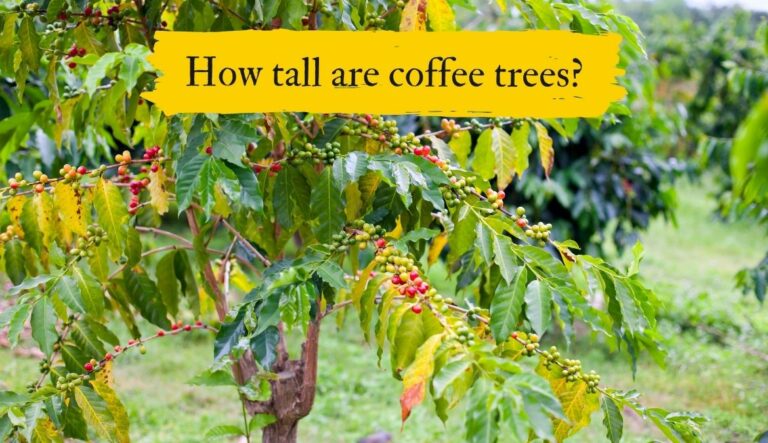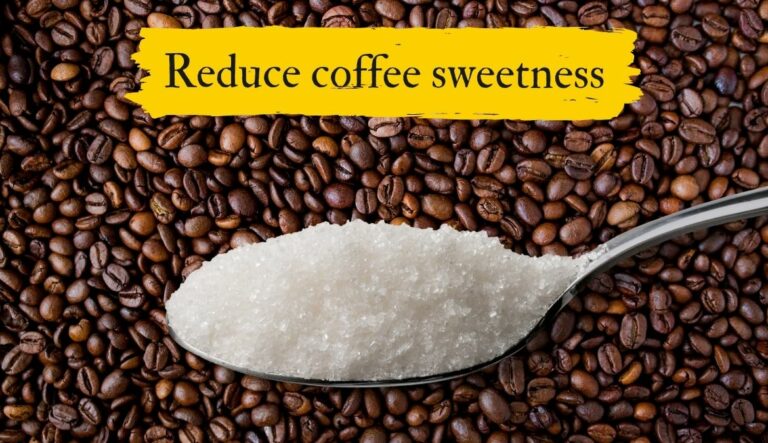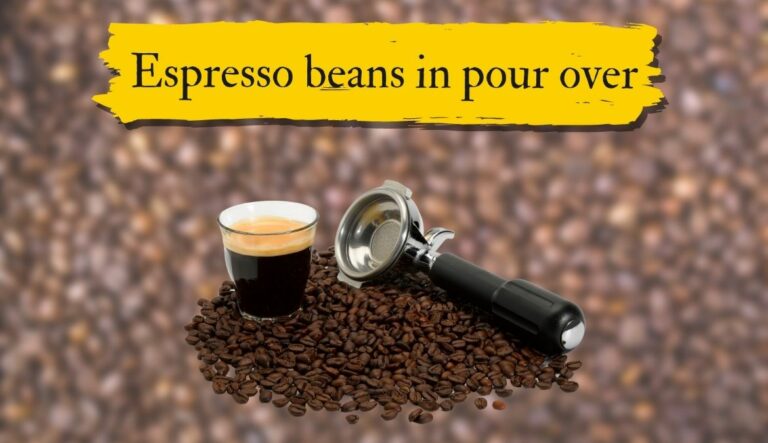You can weigh coffee without a scale by counting beans or using a tablespoon to measure whole or ground beans. An average coffee bean weighs 0.136g. 1 tbsp of whole beans weighs 5.29g while 1 tbsp of ground coffee weighs 4.07g. Light, medium and dark roast coffee weigh different because they have varying moisture levels.
Bookmark this article and use it as a quick reference for weighing coffee if you don’t have a scale or when your scale runs out of batteries.
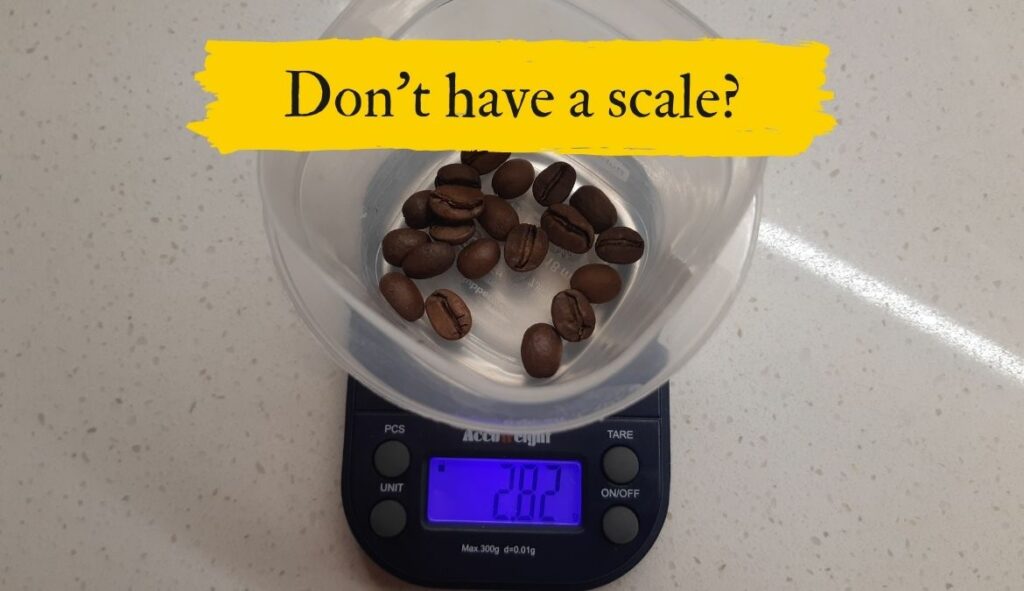
How much does a coffee bean weigh?
An average coffee bean weighs 0.136g. A light roast bean weighs about 0.141g, a medium roast bean weighs about 0.137g, and a dark roast bean weighs about 0.130g. Darkers roasted coffee weighs less because it contains less moisture.
The moisture has evaporated due to a higher roasting temperature.
| Roast level | Weight of one coffee bean |
|---|---|
| Light roast coffee | 0.141 grams |
| Medium roast coffee | 0.137 grams |
| Dark roast coffee | 0.130 grams |
Coffee beans can also vary in weight depending on where they are grown. Coffee grown above 2,000 meters above sea level (MASL) grows more slowly and more densely. This makes it a little heavier on average than beans grown at a lower altitude.
The table above is based on an experiment we ran where we weighed 20 coffee beans of different roast levels. The resulting number above is an average of each bean based on these measurements.
Simply divide your desired weight of coffee by the numbers in the table above to get an estimate on how many beans you need for your coffee.
How much does a tablespoon of coffee weigh?
A level tablespoon of whole bean coffee weighs about 5.29g while one tablespoon of ground coffee weighs about 4.07g. Light, medium and dark roast coffee weigh slightly different from each other though due to varying moisture levels.
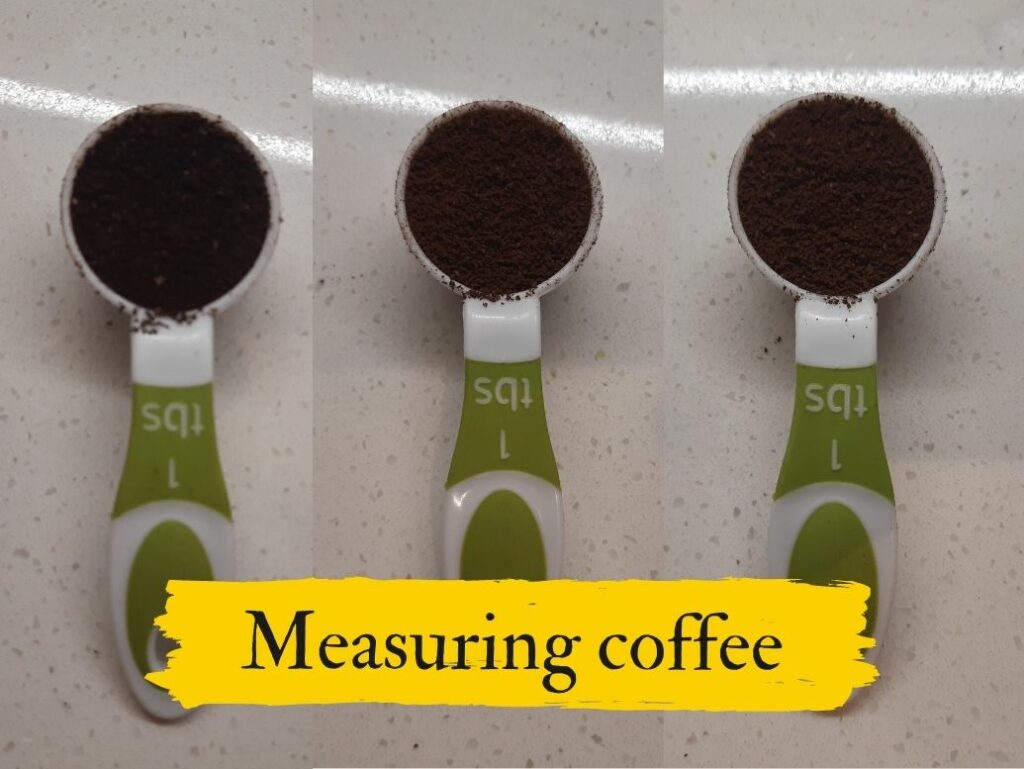
We weighed different roasts levels of whole bean and ground coffee in a tablespoon. The table below shows how much each weighed on average.
| Roast level | 1 tablespoon (whole bean) | 1 tablespoon (ground) |
|---|---|---|
| Light roast coffee | 5.73 grams | 4.06 grams |
| Medium roast coffee | 5.16 grams | 4.48 grams |
| Dark roast coffee | 4.97 grams | 3.67 grams |
How to weigh pour over coffee without a scale
You can prepare pour over coffee without a scale by measuring the volume of water and by either counting the number of whole beans or using a tablespoon measurement for ground beans. A common 330ml cup of coffee will require 330ml of water and either 156 whole beans or 5.42 tbsp of ground beans.
| Coffee volume | No. of light roast beans | Tablespoons of ground light roast |
|---|---|---|
| 270ml | 128 beans | 4.43 tbsp |
| 285ml | 135 beans | 4.68 tbsp |
| 300ml | 142 beans | 4.93 tbsp |
| 315ml | 149 beans | 5.17 tbsp |
| 330ml | 156 beans | 5.42 tbsp |
| 345ml | 163 beans | 5.67 tbsp |
How can I measure coffee without a scoop?
You can measure coffee without a standard coffee scoop by weighing the beans, counting individual beans or by using a tablespoon. A coffee scoop is 2 tablespoons and contains about 10.57g of whole bean coffee or 8.14g of ground coffee.
If you have a food scale, you can reference the table below to measure how much coffee to use based on how many coffee scoops you typically use. If this is the case, it’s more accurate to weigh your coffee anyways than to use a scoop measurement.
| Roast level | 1 coffee scoop (whole beans) | 1 coffee scoop (ground) |
|---|---|---|
| Light roast coffee | 11.46 grams | 8.12 grams |
| Medium roast coffee | 10.32 grams | 8.96 grams |
| Dark roast coffee | 9.94 grams | 7.34 grams |
If you don’t have a scale then you can count individual beans. The average coffee scoop will hold about 77 whole beans. But you can refer to the table below based on the roast type you’re using.
| Roast level | 1 coffee scoop (whole beans) |
|---|---|
| Light roast coffee | 81 beans |
| Medium roast coffee | 75 beans |
| Dark roast coffee | 76 beans |
The reason the number of beans differs by roast is because the coffee beans are different sizes. Coffee beans expand the darker they are roasted. So a coffee scoop will hold fewer dark beans than light beans.
What can I use to weigh coffee?
The best thing to weigh coffee with is a food scale that rounds to the nearest tenth of a gram. But you can also use scales that simply measure to the nearest whole gram. There are also special coffee scales that include a stopwatch so you can time your pour over without needing to pull out your smartphone.
If you don’t have a food scale then you can weigh your coffee by counting your beans or measuring the whole or ground beans using a tablespoon. Use the tables above to calculate this manual method of weighing.
How do you measure 10g of coffee?
10g of coffee is roughly 74 whole beans. It is also equivalent to about 1.89 tablespoons of whole beans or 2.46 tablespoons of ground beans. However, these numbers will change slightly depending on the roast level you are using.
The table below provides an estimated number of light, medium and dark roast beans for 10-25g of coffee. This should give you an idea of how much coffee is required for most single-serve coffee making methods.
| Grams of coffee | No. of light roast beans | No. of medium roast beans | No. of dark roast beans |
|---|---|---|---|
| 10 grams | 71 beans | 73 beans | 77 beans |
| 11 grams | 78 beans | 80 beans | 85 beans |
| 12 grams | 85 beans | 88 beans | 92 beans |
| 13 grams | 92 beans | 95 beans | 100 beans |
| 14 grams | 99 beans | 102 beans | 108 beans |
| 15 grams | 106 beans | 109 beans | 115 beans |
| 16 grams | 113 beans | 117 beans | 123 beans |
| 17 grams | 121 beans | 124 beans | 131 beans |
| 18 grams | 128 beans | 131 beans | 138 beans |
| 19 grams | 135 beans | 139 beans | 146 beans |
| 20 grams | 142 beans | 146 beans | 154 beans |
| 21 grams | 149 beans | 153 beans | 161 beans |
| 22 grams | 156 beans | 161 beans | 169 beans |
| 23 grams | 163 beans | 168 beans | 177 beans |
| 24 grams | 170 beans | 175 beans | 185 beans |
| 25 grams | 177 beans | 182 beans | 192 beans |


